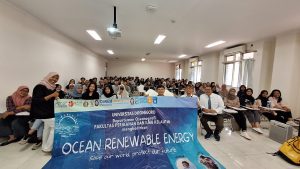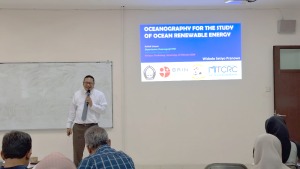Renewable energy is increasingly becoming the primary focus in efforts to reduce dependence on environmentally damaging fossil fuels. In the field of oceanography, ocean renewable energy emerges as a promising beacon of hope. With vast potential from the expansive oceans, various technologies are continuously being developed to generate clean and sustainable energy.
Oceanography faculty lecturer, Rikha Widiaratih, S.Si., M.Si., along with Professor Widodo Setiyo Pranowo from the Research and Innovation Agency (BRIN), recently held a public lecture for students of the Faculty of Fisheries and Marine Sciences (FPIK) at Diponegoro University. The lecture aimed to raise awareness about ocean renewable energy. The discussion covered various types of renewable energy from the sea and the role of oceanography in developing these technologies.
One type of ocean renewable energy garnering attention is Ocean Thermal Energy Conversion (OTEC). This technology harnesses the temperature difference between warm surface ocean layers and colder depths. The process utilizes the steam formed from this temperature difference to generate electricity through turbines.
In addition to OTEC, Wave Energy has also become a focal point of development. By harnessing the constant movement of ocean waves, specialized devices are installed in the sea to convert the kinetic energy of waves into electrical energy. This technology is not only environmentally friendly but can also operate continuously, providing a reliable energy source.
Furthermore, Tidal Energy is another form of ocean renewable energy that utilizes the ebb and flow of tides to generate power. Turbines installed underwater convert the energy from the movement of seawater into electricity. Locations with strong tidal currents, such as narrow straits or river estuaries, hold significant potential for this technology.
In the context of Indonesia, an archipelagic nation with vast ocean territories, the potential for developing ocean renewable energy is immense. The utilization of ocean thermal energy in Indonesia’s tropical waters presents an intriguing option, while wave energy can be optimized in coastal areas with strong waves.
Recognizing this potential, researchers and oceanography experts are continuously conducting research and development to accelerate the adoption of ocean renewable energy technologies. Collaboration between the government, industry, research institutions, and the engagement of students is key to accelerating the implementation of ocean renewable energy to support future energy sustainability.
With the continuous advancement of ocean renewable energy technologies, the vision of a cleaner and more sustainable future is becoming a reality. Ocean renewable energy is not just an environmentally friendly option but also a solution to reduce negative impacts on the marine environment, crucial for our continued existence.




Recent Comments